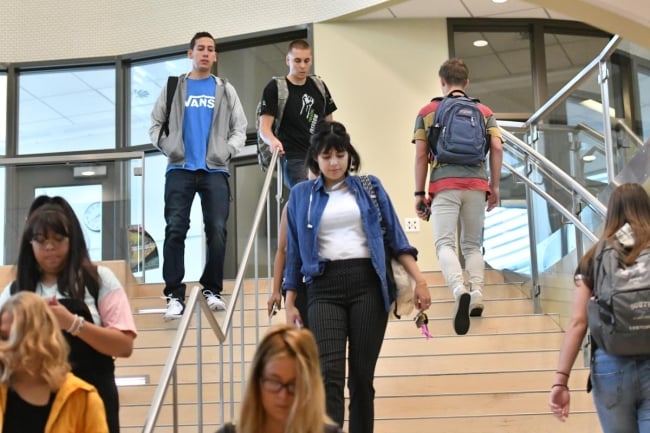You have /5 articles left.
Sign up for a free account or log in.

A communications professor at Salt Lake Community College implemented an anonymous mental health check-in with his students to assess their well-being.
Salt Lake Community College
Addressing students’ mental health remains a top concern for higher education professionals. A survey from virtual health services provider TimelyMD found 50 percent of college students identified their mental health struggles as their top stressor for 2023, and 71 percent of students surveyed indicated they struggle with issues such as stress, anxiety and depression.
One professor implemented regular anonymous check-ins with his classes to normalize talking about mental health in the classroom.
“I just looked at my job as trying to normalize [mental health discussions] for them, to try to get them used to somebody actually saying, ‘How are you today? And if you’re not OK, that’s OK,’” Matt Merkel, a Salt Lake Community College associate professor, shares.
How it works: At the start of each class, Merkel creates an anonymous Zoom poll for his students to provide a check-in on their mental and emotional health that day. The poll is a 10-point scale—modeled loosely after health care’s 10-point pain scale—with a 10 being the best and one being “I’m just pressing buttons today,” he says.
Since transitioning back to in-person classes, Merkel has found it’s still effective to use Zoom to poll students, as its connection to the Canvas learning management system makes it an easy click-in.
Survey says: After a class participates in a poll, Merkel shares the results with his students immediately.
“One of the biggest things towards really achieving a good mental health environment is allowing people to be honest about it and to share it,” Merkel says.
A 2020 Healthy Minds Study from Boston University found while only 6 percent of college students indicated they would think less of someone who has received mental health treatment, 45 percent of students believe others hold a negative stigma around receiving mental health treatment.
Merkel has found his class check-ins reflect national data regarding the average student’s mental health—around one-third report excellent health and are prepared to tackle the day, another third are somewhere in the middle, and the last third are averaging toward the bottom.
Merkel saves the data for himself, just to provide a record, but the mental health check-ins are mostly for interpersonal connection and transparency with his students.
“At the end of the day, the student that’s coming out of the pandemic and coming back to our institutions just wants to know they matter, just wants to know that somebody knows their name and just wants to know that somebody will genuinely ask them how they’re doing,” he says.
A step farther: Beyond the regular check-ins, Merkel altered his absence expectations to allow for up to four mental health days per semester. Students can take them whenever they want, no questions asked. The only caveat: students have to check in with Merkel prior to using their mental health day. An excused absence does not change due dates for assignments or alleviate students from completing lectures, but Merkel collaborates with students to create options or a different plan, as necessary.
Use of a mental health day also cues a one-on-one check-in with Merkel after the second or fourth occurrence. This allows Merkel to establish next steps for students so they don’t fall behind on work, to chat about the student’s well-being or to provide a reference to SLCC’s Center for Health and Counseling.
“It’s really been nothing but positive,” Merkel says. Despite some early concerns around the leniency of the policy, he’s found students use their absences intentionally and come back more prepared to learn.
Do you have an academic success tip that might help others encourage student success? Tell us about it.




